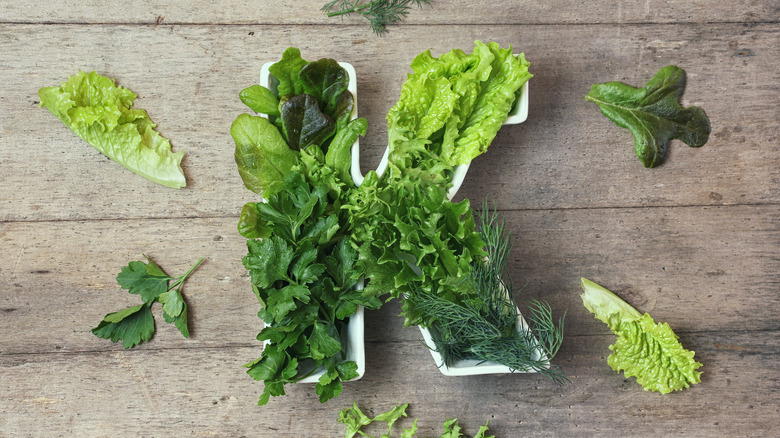You Have Too Much Vitamin K If This Happens To You
Nutritionists recommend eating raw spinach, kale, leafy greens, and other foods rich in vitamin K. This fat-soluble nutrient plays a crucial role in blood clotting, bone growth, and heart health, explains Harvard T.H. Chan School of Public Health. But having too much vitamin K in your system can be just as harmful as having too little.
Generally, adult women over 19 years old need about 90 micrograms of vitamin K per day. Men, on the other hand, should aim for 120 micrograms daily, according to the National Institutes of Health (NIH). These numbers are not set in stone, though. Your body only retains 30 to 40% of the vitamin K you get from food or supplements, states the NIH. The remaining 60 to 70% is excreted in the urine or stool. Therefore, vitamin K toxicity is rare.
Most adults get sufficient amounts of this nutrient from food. Fermented foods, leafy greens, broccoli, pine nuts, and chicken breast are excellent sources. Natto, for example, provides over 700% of the daily value for vitamin K per serving (3 ounces), says the NIH. Canned pumpkin, carrot juice, and soybean oil can be good choices, too. But what happens if you get too much vitamin K in your diet?
In rare cases, too much vitamin K may cause anemia
As discussed above, the human body only stores small amounts of vitamin K. This nutrient is likely safe, even when consumed in large doses. As of today, no upper limits have been established, says the NIH. But even so, it's possible to experience side effects from having too much vitamin K in your system. A potential consequence is hemolytic anemia, according to the Medscape. This condition can cause dizziness, confusion, yellowing of the skin and eyes (jaundice), or weakness (per Johns Hopkins Medicine). Another symptom is dark-colored urine.
Too much vitamin K may also affect blood clotting in people taking anticoagulants, explains the NIH. Warfarin and other anticoagulants are typically prescribed to prevent blood clots. These drugs work by making your blood thinner. Vitamin K promotes blood clotting and hence may interfere with anticoagulants.
The NIH states that both dietary and supplemental vitamin K is safe. The Linus Pauling Institute, on the other hand, warns that synthetic vitamin K3, or menadione, can affect glutathione levels and cause oxidative damage to cell membranes. Glutathione, the master antioxidant, protects against oxidative stress and acts as a cofactor of several enzymes (via Antioxidants). But dietary vitamin K, including phylloquinone and menaquinone, is unlikely to cause toxicity. Plus, it's difficult to get too much vitamin K from food alone.


